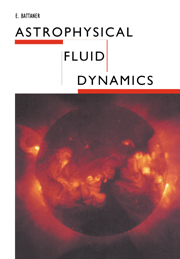Book contents
9 - THE RELATIVISTIC COSMIC FLUID
Published online by Cambridge University Press: 05 June 2012
Summary
Cosmology is a general relativistic topic. General relativity must replace Newtonian mechanics for systems in which the mass and spatial dimensions have similar orders of magnitude, M ~ r. If the density of the Universe were a constant, M/r ≈ ρr3 /r ≈ ρr2, and for large enough length scales, the condition M ≈ r would eventually be met. Let us take the current density of 10-29g cm-3 (= 7.4 x 10-58cm-2 in geometrized units). Then, for length scales of r ≈ 3.7 x 1028cm (≈ 104 Mpc), calculations must be carried out using general relativity. This length is of the order of magnitude of the observable Universe, and corresponds to objects about 1010, years old, near the commonly accepted age of the Universe.
The cosmological principle
The Newtonian interpretation of the cosmological principle must now be reconsidered. It stated that at a given time all thermodynamic parameters are homogeneously and isotropically distributed. But what kind of time? Now every observer has his proper time and thus the time that the cosmological principle takes as a reference must be specified without invoking privileged observers or systems with peculiar characteristics. General relativity assures us that at any point there is a free-falling observer, for whom nature is explained in terms of the laws of special relativity. Observers in free-fall are called fundamental observers in cosmology and the particle of cosmic fluid that they ride is called a fundamental particle, or it could be called a fundamental galaxy, taking galaxies as the pieces from which the Universe is built.
- Type
- Chapter
- Information
- Astrophysical Fluid Dynamics , pp. 184 - 209Publisher: Cambridge University PressPrint publication year: 1996



